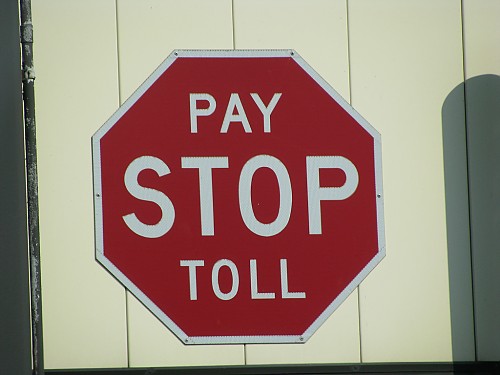|
|
In this edition of Views and News, ETI delves further into Internet-based video content delivery with an examination of how the concept of "intercarrier compensation,' originally developed for basic phone service, is now being misapplied by last-mile broadband providers to extract monopoly rents from, and limit competition among, providers of Internet content. We also review the ILECs' efforts to once again derail FCC investigations into Special Access competition and pricing.
Read on below, or navigate over to
econtech.com
where you can read online, or download a
printer-friendly version.
|
|
Intercarrier compensation in the Internet world: Charging content providers and content delivery networks for access to end users
|
|
 Ordinary local and long distance telephone calls often require the involvement of several different telecommunications carriers. This might occur, in the case of a local call, when the calling and called parties are served by different telephone companies. In the case of a long distance call, a third “interexchange” carrier (“IXC”) may also be involved, to transport the call between the two local carriers where they do not directly interconnect with each other. For traditional switched telephone calls, one party – usually the caller but in some cases, such as for 800-type “toll-free” services, the called party, pays for the entire call. Thus, with all of the revenue being realized by one carrier while the services of one or more other carriers may be required to complete the call, some process is needed to assure that all of the carriers involved in providing the end-to-end connection receive compensation for their respective work.
Ordinary local and long distance telephone calls often require the involvement of several different telecommunications carriers. This might occur, in the case of a local call, when the calling and called parties are served by different telephone companies. In the case of a long distance call, a third “interexchange” carrier (“IXC”) may also be involved, to transport the call between the two local carriers where they do not directly interconnect with each other. For traditional switched telephone calls, one party – usually the caller but in some cases, such as for 800-type “toll-free” services, the called party, pays for the entire call. Thus, with all of the revenue being realized by one carrier while the services of one or more other carriers may be required to complete the call, some process is needed to assure that all of the carriers involved in providing the end-to-end connection receive compensation for their respective work.
The Internet grew up as a “network of networks” without any consequential regulatory involvement. Regional backbone carriers realized early on that interconnection and exchanges of traffic between and among their networks would increase the value of each and thus be mutually beneficial, and so without any regulatory prodding or prescription they negotiated bilateral “peering” arrangements governing their exchanges of inter-network traffic. End user access charges were not an issue, since users bought and paid for their Internet access from a local Internet Service Provider (ISP), initially on a dial-up basis, and later via a broadband service purchased either from the local phone or cable tv company. Unlike switched telephone service, in the Internet world all network users – consumers and host websites – were each responsible for obtaining and paying for the telecom link between their premises and the point within the Internet “cloud” where internetwork traffic would be exchanged, and for selecting and paying for the particular upload and download speeds they needed.
But all of that has changed....
Continue reading at econtech.com
|
|
Will the ILECs delay the FCC’s latest effort to collect data on special access competition in one of the longest-running FCC dockets?
|
|
 The major ILECs have long contended that their Special Access services face extensive competition from CLECs, and that if the FCC would only collect data on just how many buildings were “lit” by CLEC-owned facilities, the ILECs’ claim would be borne out. So on October 28, the FCC went ahead and issued a Public Notice seeking voluntary data submissions from CLECs detailing the facilities they own that are capable of providing services that compete with ILEC Special Access. Faced with the prospect that such CLEC hard data might actually refute the ILECs’ claims, the ILECs now appear to be setting the stage to argue that the CLEC data being sought by the FCC will not provide an adequate basis for a decision in the long-running Special Access proceeding, and on December 1 the ILECs, through their trade organization US Telecom, made an ex parte submission purportedly to ask that the FCC expand and clarify the outstanding data request.
The major ILECs have long contended that their Special Access services face extensive competition from CLECs, and that if the FCC would only collect data on just how many buildings were “lit” by CLEC-owned facilities, the ILECs’ claim would be borne out. So on October 28, the FCC went ahead and issued a Public Notice seeking voluntary data submissions from CLECs detailing the facilities they own that are capable of providing services that compete with ILEC Special Access. Faced with the prospect that such CLEC hard data might actually refute the ILECs’ claims, the ILECs now appear to be setting the stage to argue that the CLEC data being sought by the FCC will not provide an adequate basis for a decision in the long-running Special Access proceeding, and on December 1 the ILECs, through their trade organization US Telecom, made an ex parte submission purportedly to ask that the FCC expand and clarify the outstanding data request.
The ILECs now claim that “the data the FCC receives [in response to the data request] will quickly become outdated and will miss significant competitive activity” and that the Commission should collect data about CLEC operational plans two years out (through the end of 2013). After having spent a decade claiming (but without any evidence) that competition was robust and thereby attempting to direct the FCC’s gaze away from the hundreds of filings and thousands of pages of evidence documenting ILEC market power and the abuse thereof as it relates to special access services, it seems that the ILECs fear that a complete view of existing CLEC facilities will confirm that in many places that competition is all but nonexistent. Since delaying the decision has proven to be enormously profitable for the ILECs over the last decade, it is no surprise that the groundwork for further delay of a decision has now been laid....
Continue reading at econtech.com
|
|
ETI paper on reclassification of broadband Internet access published in theFederal Communications Law Journal now available
|
|
 As the debate over net neutrality and reclassification of broadband Internet access to Title II common carrier status heats up, ETI's Lee Selwyn and Helen Golding have weighed in on the discussion with a new article reviewing the factual and legal bases for a far more expansive approach to reclassification than the limited proposal put forth earlier this year by the FCC. The paper is being published in the December 2010 issue of the Federal Communications Law Journal.
As the debate over net neutrality and reclassification of broadband Internet access to Title II common carrier status heats up, ETI's Lee Selwyn and Helen Golding have weighed in on the discussion with a new article reviewing the factual and legal bases for a far more expansive approach to reclassification than the limited proposal put forth earlier this year by the FCC. The paper is being published in the December 2010 issue of the Federal Communications Law Journal.
In their article, "Revisiting the Regulatory Status of Broadband Internet Access: A Policy Framework for Net Neutrality and an Open Competitive Internet," Selwyn and Golding explore how a decade of broadband access deregulation has landed the FCC at a legal dead-end. After the DC Circuit's Comcast decision last April, the Commission now finds itself unable to enforce its "net neutrality" goals. To reassert its jurisdiction over "net neutrality," the FCC proposes to reclassify broadband Internet access as a Title II "telecommunications service" while continuing to forbear from most other facets of common carrier regulation....
Continue reading at econtech.com
Click here to download the article
|
|
|
|
About ETI. Founded in 1972, Economics and Technology, Inc. is a leading research and consulting firm specializing in telecommunications regulation and policy, litigation support, taxation, service procurement, and negotiation. ETI serves a wide range of telecom industry stakeholders in the US and abroad, including telecommunications carriers, attorneys and their clients, consumer advocates, state and local governments, regulatory agencies, and large corporate, institutional and government purchasers of telecom services. |
|
|